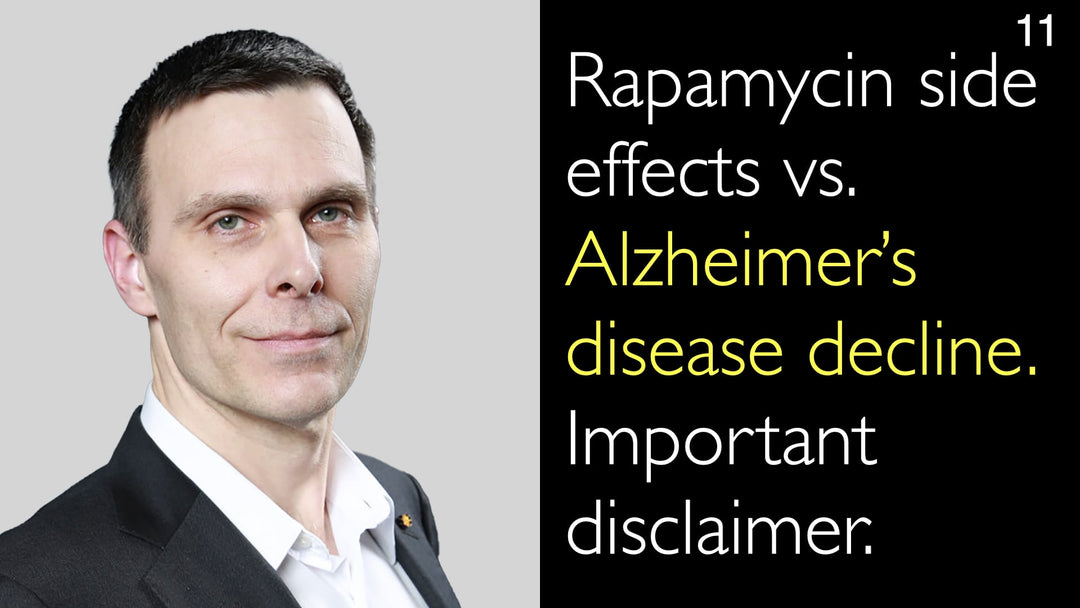Dr. Matt Kaeberlein, MD, PhD, ein führender Experte auf dem Gebiet der Alterns- und Rapamycinforschung, erläutert eine neue Studie zur Off-Label-Anwendung von Rapamycin bei Alzheimer-Demenz. Er stellt ein umfragebasiertes Forschungsprojekt vor, das Patientenerfahrungen und Daten zu Nebenwirkungen erfasst. Dr. Kaeberlein betont den experimentellen Charakter dieser Behandlung und rät Patienten eindringlich, Rapamycin ausschließlich unter ärztlicher Aufsicht anzuwenden.
Rapamycin bei Alzheimer: Off-Label-Use und aktuelle Forschung
Direkt zum Abschnitt
- Off-Label-Rapamycin-Studie
- Erfassung von Patientenerfahrungsdaten
- Hochrisiko-Alzheimer-Patienten
- Nebenwirkungsprofil von Rapamycin
- Wichtiger medizinischer Haftungsausschluss
- Vollständiges Transkript
Off-Label-Rapamycin-Studie
Dr. Matt Kaeberlein, MD, PhD, stellt eine neue, durch Drittmittel finanzierte Studie zum Off-Label-Use von Rapamycin vor. Die Initiative befragt Personen, die Rapamycin aus verschiedenen gesundheitlichen Gründen einnehmen. Besonderes Augenmerk liegt auf Patienten, die das Medikament zur Behandlung von Alzheimer oder zur Risikoreduktion verwenden. Im Gespräch mit Dr. Anton Titov, MD, erläutert Dr. Kaeberlein die Ziele des Projekts. Es handelt sich nicht um eine doppelblinde, placebokontrollierte klinische Studie.
Erfassung von Patientenerfahrungsdaten
Die Studie setzt auf umfangreiche Patientenbefragungen. Dr. Matt Kaeberlein, MD, PhD, erklärt, wie dabei wahrgenommene Nutzen und Nebenwirkungen erfasst werden. Zusätzlich werden medizinische und zahnmedizinische Unterlagen der Teilnehmer ausgewertet. So lässt sich ein quantitatives Vorher-Nachher-Bild der Rapamycin-Anwendung erstellen. Dr. Kaeberlein betont gegenüber Dr. Anton Titov, MD, dass dieser Ansatz wertvolle Real-World-Daten liefern kann.
Hochrisiko-Alzheimer-Patienten
Ein Fokus liegt auf ApoE4-Homozygoten mit hohem Demenzrisiko. Dr. Matt Kaeberlein, MD, PhD, kooperiert mit Dr. Alan Green, einem Pionier der Off-Label-Verschreibung von Rapamycin. Dr. Green behandelt viele Patienten mit diesem Risikoprofil. Deren Alzheimer-Risiko liegt deutlich über dem der Allgemeinbevölkerung. Die Auswertung ihrer Rapamycin-Erfahrungen könnte wichtige Hinweise auf präventive Effekte liefern.
Nebenwirkungsprofil von Rapamycin
Ein Hauptziel der Studie ist die Quantifizierung unerwünschter Wirkungen bei Nicht-Transplantationspatienten. Dr. Matt Kaeberlein, MD, PhD, hebt den unterschiedlichen Anwendungskontext hervor. Off-Label-Anwender nehmen typischerweise wöchentlich 4 bis 6 Milligramm Rapamycin ein. Das unterscheidet sich grundlegend von der Hochdosistherapie bei Organtransplantierten, die zusätzlich andere Immunsuppressiva erhalten. Die Erfassung des realen Nebenwirkungsprofils ist ein zentrales Forschungsanliegen.
Wichtiger medizinischer Haftungsausschluss
Sowohl Dr. Matt Kaeberlein, MD, PhD, als auch Dr. Anton Titov, MD, betonen diesen entscheidenden Punkt. Rapamycin bleibt ein experimentelles Medikament für Alzheimer und altersbedingte Anwendungen. Es ist verschreibungspflichtig und erfordert ärztliche Überwachung. Dr. Kaeberlein warnt ausdrücklich vor Selbstmedikation. Personen, die ihn kontaktieren, verweist er stets an ihren behandelnden Arzt oder Tierarzt. Diese Informationen dienen ausschließlich Bildungszwecken und ersetzen keine medizinische Beratung.
Vollständiges Transkript
Dr. Anton Titov, MD: Das war meine Folgefrage, als ich von dieser langen und schmerzhaften Reise hörte, von der Sie sprechen. Es gibt große Patientengemeinschaften – Patienten wie mich, aber auch andere Gruppen. Alzheimer belastet Pflegende, Familien und Angehörige enorm.
Es muss also Menschen geben, die Rapamycin bei Alzheimer-Patienten Off-Label ausprobieren, vielleicht sogar auf eigene Initiative. Gibt es Forschung, die zumindest versucht, diese Daten zusammenzuführen? Das geschieht bei anderen Indikationen; Menschen tun das im Rahmen der Quantified-Self-Bewegung oder ähnlicher Initiativen. Was unternehmen Sie in dieser Hinsicht?
Dr. Matt Kaeberlein, MD: Ich bin froh, dass Sie fragen, denn wir haben kürzlich ein Stipendium vom Impetus Grant Program erhalten, um genau das zu tun. Innerhalb der nächsten zwei bis drei Wochen starten wir eine groß angelegte, befragungsbasierte Studie mit Personen, die Rapamycin Off-Label einnehmen – nicht nur bei Alzheimer oder Alzheimer-Risiko, sondern für verschiedene gesundheitliche Effekte.
Wir erfassen Daten zu Nebenwirkungen und potenziell wahrgenommenen Nutzen. Wir bitten die Patienten auch, uns medizinische und zahnmedizinische Unterlagen zur Verfügung zu stellen, um ein quantitatives Vorher-Nachher-Bild der Rapamycin-Anwendung zu erstellen.
Es ist keine doppelblinde, placebokontrollierte klinische Studie. Aber wie Sie andeuten, lassen sich so dennoch wertvolle Erkenntnisse aus der Praxis gewinnen.
Wir arbeiten mit Dr. Alan Green zusammen, einem der führenden Ärzte bei der Off-Label-Verschreibung von Rapamycin. Er behandelt viele ApoE4-homozygote Patienten – nicht unbedingt mit bereits manifester Demenz, aber mit hohem Risiko, deutlich höher als die Allgemeinbevölkerung –, die Rapamycin einnehmen.
Eine beträchtliche Anzahl von ApoE4-Homozygoten ist darunter. Deren Erfahrungen werden besonders aufschlussreich sein.
Wir sehen dies als Chance, positive Effekte – falls vorhanden – zu dokumentieren. Aber wir müssen klarstellen: Wir wissen es noch nicht; deshalb planen wir eine richtige klinische Studie. Gleichzeitig wollen wir die Häufigkeit unerwünschter Wirkungen quantifizieren.
Von diesen Patienten lässt sich meiner Meinung nach ein recht gutes Bild gewinnen. Sie unterscheiden sich fundamental von Organtransplantierten; sie hatten keine Transplantation und nehmen keine hohen Dosen anderer Immunsuppressiva.
Die meisten nehmen Rapamycin einmal wöchentlich, vier bis sechs Milligramm. Das ist ein völlig anderes Schema als bei Transplantationspatienten. Die Erfassung der tatsächlichen Nebenwirkungsrate bei dieser Gruppe wird ebenfalls wertvoll sein.
Dr. Anton Titov, MD: Ich möchte unsere Zuhörer daran erinnern, dass nichts von dem, was wir besprechen – weder von Ihnen noch von anderen – als medizinische Beratung zu verstehen ist. Es dient ausschließlich Informations- und Bildungszwecken.
Personen sollten stets ihren Arzt konsultieren. Dieser Haftungsausschluss ist wichtig; man sollte Internetinhalte nie als medizinischen Rat oder Handlungsaufforderung auffassen. Das ist essenziell.
Dr. Matt Kaeberlein, MD: Dem stimme ich voll zu. Es überrascht Sie vielleicht nicht, dass ich oft von Menschen kontaktiert werde, die Rapamycin für sich oder ihren Hund wollen. Meine Antwort ist immer dieselbe: Es handelt sich um ein experimentelles Medikament für diese Anwendungen, und es ist verschreibungspflichtig.
Rechtlich benötigen Sie ein Rezept – vom Tierarzt für Ihren Hund, vom Arzt für sich selbst. Und Sie sollten dies unbedingt unter Aufsicht und mit Wissen Ihres Arztes tun.
Ich betone: Das ist keine medizinische Beratung. Wenn Sie es in Erwägung ziehen, tun Sie es bitte nur unter ärztlicher Begleitung. Dieses Verständnis ist wirklich wichtig.




